Hello there! Call me Kapen (he/they)! I reblog writing refs/advice and will be posting WIP related stuff here.
Last active 3 hours ago
Don't wanna be here? Send us removal request.
Text
You all need to hear this:
1. You probably dont suck at your craft as much as you think you do, I bet a lot of people are amazed at what you can make, and
2. If you actually are the Literal Worst In The Whole Wide World at your craft... who the fuck cares? What are they gonna do, call the police on you? Keep making your shitty little things, youre the boss of you, fuck the haters.
33K notes
·
View notes
Text
A long time ago, when I was in an elementary school - I think it was around 2005 - you could just make yourself a blog. For free. In fact, you could have as many blogs as you please. It was a service from one of the most popular websites here. And boy, did we have a lot of those.
It was before I have learnt about fanfiction.net. It was way before Ao3. It was the place where the fanfics were born for us.
There was a popular fanblog for one of the most beloved franchises in my country. It even won an official contest for the best fansite. And it hosted their own contest for "a character's diary" type of fanfics. We were to write new stories and post it, first person POV, and they were choosing the best in their category.
I won in one and I was there, writing, for... not sure how long, but at least a year, having great fun. But it's not about me.
Thanks to that, I've found another blogs with fanfics. One of them - with a story exclusively of my favourite characters.
And I just want to say - it was one of the most formative experiences of my life.
I loved this story. I loved this story so much I was using all of the prepaid card money on my Nokia to read even a small glimpse of the newest update when on vacation and away from my PC (let me remind you, it was 2005!). I actually became friends with the author and we are in contact to this day.
This fanfic was so, so important for me.
Was it good? It was a story written by middleschooler for another middleschoolers. But for me it was the best. Was it popular? No, it wasn't. I mean... it was 2005. The "popularity" in today's terms wasn't really reachable for us. Why was it so big for me? Because it was about my favourite blorbos! For us, back then, it was the whole world. It was our happy place. It was my happy place.
What I want to say is - you never know, if something you write, however small, won't become this Very Important Thing in someone's life. Maybe not one of the milestones, but a comfort fic. A thing you remember when you get sad. Something significant- even for one person.
I don't know if anyone else remembers that blog and the story it held. It is long gone.
But I can still, 20 years later, recall all the names of the OCs.
That's the power you hold.
Keep writing.
263 notes
·
View notes
Text
Don't wait to write. Just start.
Don’t wait until your idea feels “good enough” to start writing. There is no such this as the perfect idea, or the perfect time.
The best stories often begin as messy, uncertain thoughts. Just a note in the margin of a notebook.
Start before you’re ready. The process of writing is how you figure out what you’re really trying to say. Clarity comes through the process, not before it.
1K notes
·
View notes
Text
You were born with a unique set of eyes, ones that allowed you to view the sea as clear as glass. By the time you got old enough to join your ship’s crew, you were smart enough to know not to tell them about everything you saw below the waves.
7K notes
·
View notes
Text
you can’t edit a blank page, I say as I slap down 3k words that I know I’ll have to edit to hell and back
20 notes
·
View notes
Text
You WILL write your WIP
You WILL write your WIP
You WILL write your WIP
You WILL write your WIP
You WILL write your WIP
You WILL write your WIP

You WILL write your WIP
You WILL write your WIP
You WILL write your WIP
You WILL write your WIP
You WILL write your WIP
You WILL write your WIP
You WILL write your WIP
7K notes
·
View notes
Text

My story "It Holds Her in the Palm of One Hand" (aka bird story) is in this month's issue of Lightspeed Magazine!
I'm so excited to finally be able to share bird story. Whenever I write sci-fi, I spend way too long on the speculative biology, and this is no exception. The gastor birds are one of my favorite creations, where I challenged myself to design an animal capable of traveling between planets. I hope you enjoy reading their story as much as I enjoyed writing it.
Parts one and two will be available for free to read online on the 6th and 13th, but if you want to read it now, consider purchasing the issue or subscribing to the magazine :)
128 notes
·
View notes
Text
i present to you a story where you see color when you meet you soulmate. but there is an aromantic character. and the aromantic character sees color only after they've learned to love themselves
2K notes
·
View notes
Text

It's official! My second book, HANS VOGEL IS DEAD, VOL. 2 is available for preorder! Continuing the story of Hans Vogel, a dead German WWII pilot going through a surrealist afterlife of the Brothers Grimm fairy tales, Hans plunges deeper into a world falling into the same fascist trap of the one he left. Dealing with guilt, responsibility, and our actions in authoritarian regimes, HANS VOGEL IS DEAD is an antifascist fairy tale that will knock your socks off.
Amazon Barnes & Noble Your local comic store!
20 notes
·
View notes
Text
I hate to break it to you, but they were right. You really do just have to finish that first draft. It can be a hot mess, but you can’t clean up a room that doesn’t exist
4K notes
·
View notes
Text

if it's good enough for you, then it deserves to be made. don't let anyone else decide if your story is worth it or not.
51K notes
·
View notes
Text
I'm in this photo and I don’t like it

6K notes
·
View notes
Text
So Nanowrimo is actually dead.
After 25 years of operation, Nanowrimo is shutting down.
An email came out in the hours approaching April Fools







A video was attached to the email, which can be viewed here:
youtube
The video is on Kilby’s channel and not the long dead Nanowrimo channel. The video is full of…
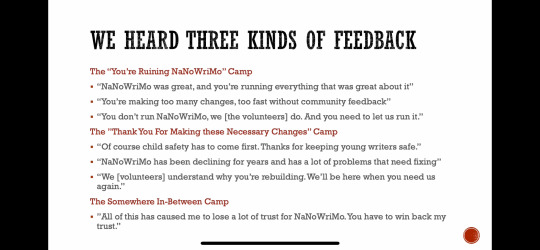

Kilby logic, but there is some relevant information contained within.
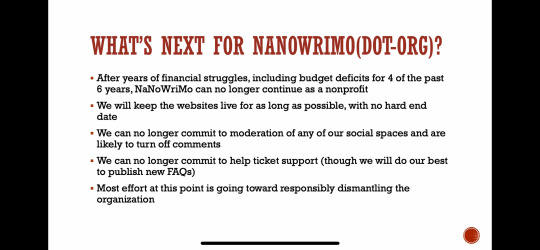
If have anything on Nanowrimo you need to get off the site, take it now. The site will likely not be around for too much longer.
Despite everything that the organisation has been through, the closure of a 25 year old nonprofit is still a tragedy, and my heart goes out to everyone that’s grieving from this. Nano has hurt a lot of people, but it meant a lot to so many, and I will be sorry to see that go.
Even if I don’t agree with many things in the recent video, I can agree with the sentiment of one slide.
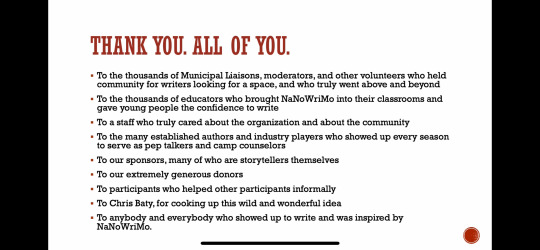
I will update you all if and when relevant information comes out. Despite everything, I now doubt that this will be my last post.
3K notes
·
View notes
Text


do people have no shame anymore?
30K notes
·
View notes
Text
shoutout to readers who like, kudos, bookmark and comment on older fics, it really means so much, especially for those of us stuck in a writing rut who haven't written for some time, you guys are awesome <3
1K notes
·
View notes
Text
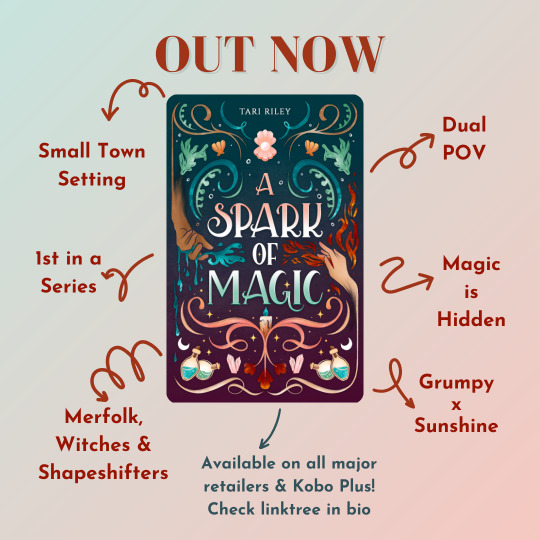
✨ A SPARK OF MAGIC RELEASE ✨
The rumours are true. A Spark of Magic is out into the world and you can get it now and read it to your heart's desire. I hope you're excited to meet Alice and Isaac, follow them on their adventures and stick around for what's to come. I had a lot of fun writing this book and I hope that same love, care and excitement reaches you once you pick this book up. Thank you for giving it a chance!
Rest assured, this is only the beginning 🔮🐚✨
Synopsis
Life can change in an instant.
Isaac had it all: place on the swimming team, popularity amongst his peers, and acceptance to a prestigious university. Until he didn’t. Now, he grows a tail whenever water is involved. He is running out of time and ideas.
Danger looms around every corner.
Alice has only wanted one thing: to get her magic back. After having her life turned upside down, reconnecting with her powers is the only way to prove her worth as a witch, and hopefully leave her small town for good.
Help is worth risking everything.
Isaac knows Alice might be his only chance at getting his life back, but her help doesn’t come without sacrifices. Differences must be put aside to find a solution, even when everything feels like it is trying to drive them apart. Luckily they seem to agree on one thing: this should be their secret.
Secrets are hard to keep. The answers are even harder to find.
Trust can be earned, but at what cost?
44 notes
·
View notes
Text


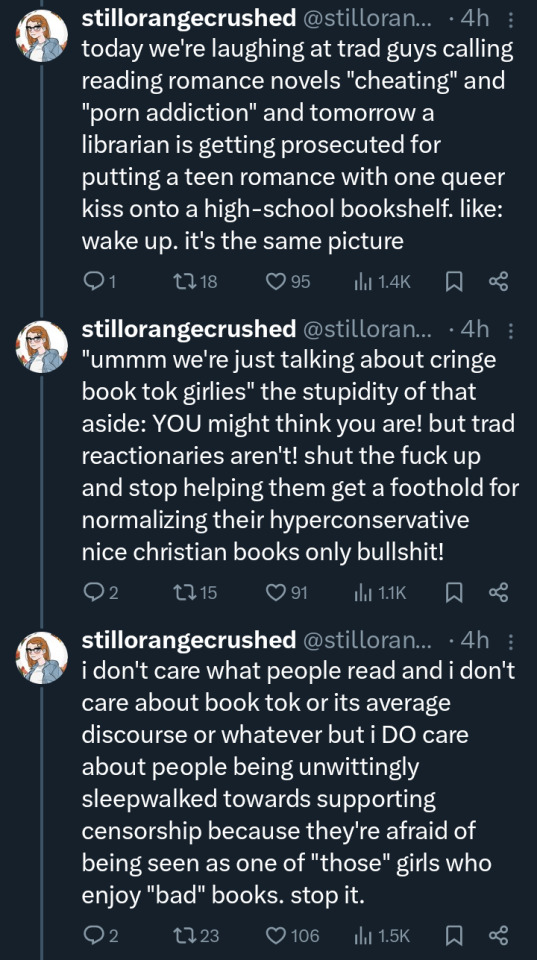

It's all fun and games and laughing at BookTok until you can't get on AO3 anymore, as someone who likes both romance and fanfic.
27K notes
·
View notes